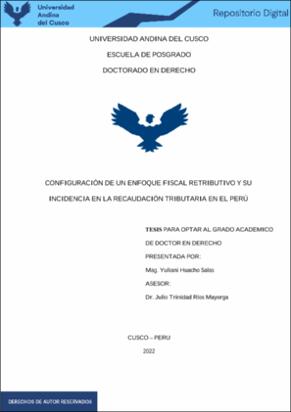| dc.contributor.advisor | Ríos Mayorga, Julio Trinidad | |
| dc.contributor.author | Huacho Salas, Yuliani | |
| dc.date.accessioned | 2022-07-11T20:13:22Z | |
| dc.date.available | 2022-07-11T20:13:22Z | |
| dc.date.issued | 2022-05-09 | |
| dc.identifier.uri | https://hdl.handle.net/20.500.12557/4750 | |
| dc.description.abstract | La recaudación tributaria y la evasión fiscal constituyen para los Estados dos grandes temas
de interés; por un lado, está el desafío de lograr el incremento en la recaudación y disponer
de los recursos necesarios para la atención de sus fines y objetivos; y, por otro lado, está la
permanente lucha contra la evasión. Históricamente se ha demostrado que la coerción, las
acciones inductivas, la generación de riesgo y la promoción de cultura tributaria han
resultado insuficientes para incrementar la recaudación y luchar contra la evasión. En ese
entender, se considera importante explorar los aportes de las disciplinas del comportamiento
humano y su contribución en el cumplimiento fiscal; toda vez que los estudios económicos,
sociales y psicológicos sobre la conducta del ser humano señalan que este actúa movido por
beneficios o recompensas, que pueden ser de carácter económico, moral o social, como el
reconocimiento, por ejemplo. En ese sentido, resultaría conveniente plantear la correlación
entre el beneficio personal obtenido por parte del contribuyente por el pago de sus impuestos.
A esta correlación entre impuesto y beneficio personal se le ha denominado enfoque fiscal
retributivo, el cual, dentro de nuestro ordenamiento jurídico tributario, se considera que
estimularía el cumplimiento fiscal, incrementaría la recaudación tributaria y contribuiría en
la lucha contra la evasión; proponiéndose el diseño de la Contribución Independiente
Retributiva – CIR, Abono Retributivo Individual – ARI y el monotributo
cachorrero/payaquera, como figuras de enfoque fiscal retributivo. | es_PE |
| dc.description.abstract | Tax collection and tax evasion constitute two major issues of interest for the States. On the
one hand, there is the challenge of achieving an increase in collection and having the
necessary resources to attend to its aims and objectives. On the other hand, there is the
permanent fight against evasion. Historically, it has been shown that coercion, inductive
actions, the generation of risk and the promotion of a tax culture have been insufficient to
increase collection and fight against evasion. Consequently, it is very important to explore
the contributions of the human behavior disciplines and their contribution to tax compliance.
Many economic, social and psychological studies on the human behavior say that he human
behave motivated by benefits or rewards. This benefits or rewards can be economic, moral
or social, like a social recognition for example. In this sense, it would be convenient to
consider the correlation between the personal benefit by the taxpayer for the payment of their
taxes. This correlation tax between and personal benefit has been called the remunerative
tax approach. This the remunerative tax approach, in our tax legal system, it would stimulate
tax compliance, increase tax collection and contribute to the fight against evasion. So then,
I proposed to create tax figures such as: Contribución Independiente Retributiva – CIR,
Abono Retributivo Individual – ARI y el monotributo cachorrero/payaquera | en_US |
| dc.format | application/pdf | es_PE |
| dc.language.iso | spa | es_PE |
| dc.publisher | Universidad Andina del Cusco | es_PE |
| dc.rights | info:eu-repo/semantics/openAccess | es_PE |
| dc.rights.uri | https://creativecommons.org/licenses/by-nc-nd/4.0/ | es_PE |
| dc.subject | Tributación | es_PE |
| dc.subject | Evasión fiscal | es_PE |
| dc.subject | Recaudación tributaria | es_PE |
| dc.subject | Enfoque fiscal retributivo | es_PE |
| dc.title | Configuración de un enfoque fiscal retributivo y su incidencia en la recaudación tributaria en el Perú | es_PE |
| dc.type | info:eu-repo/semantics/doctoralThesis | es_PE |
| thesis.degree.name | Doctor en Derecho | es_PE |
| thesis.degree.grantor | Universidad Andina del Cusco. Escuela de Pos Grado | es_PE |
| thesis.degree.discipline | Derecho | es_PE |
| dc.publisher.country | PE | es_PE |
| dc.subject.ocde | https://purl.org/pe-repo/ocde/ford#5.05.00 | es_PE |
| renati.advisor.dni | 23821151 | |
| renati.advisor.orcid | https://orcid.org/ 0000-0002-0522-3559 | es_PE |
| renati.author.dni | 42765412 | |
| renati.discipline | 421018 | es_PE |
| renati.juror | Díaz Torres, José Hildebrando | |
| renati.juror | Castro Cuba Barineza, Isaac Enrique | |
| renati.juror | Livia Robalino, Wilma Yecela | |
| renati.juror | Salazar Mujica, Alan Felipe | |
| renati.level | https://purl.org/pe-repo/renati/level#doctor | es_PE |
| renati.type | https://purl.org/pe-repo/renati/type#tesis | es_PE |


